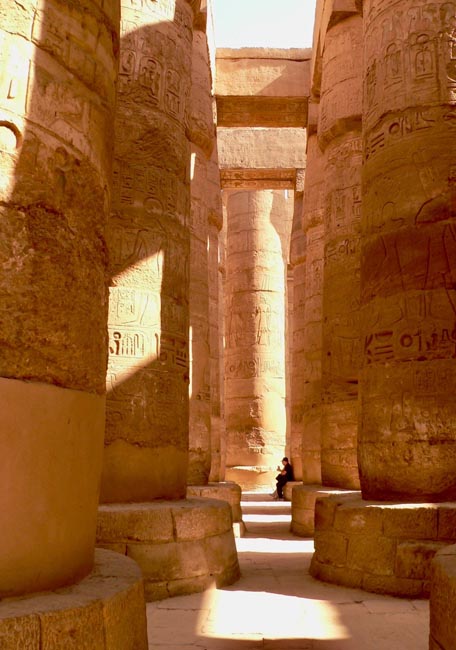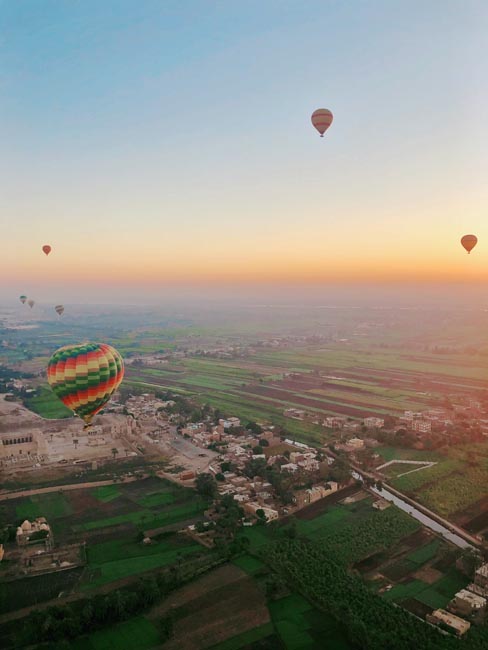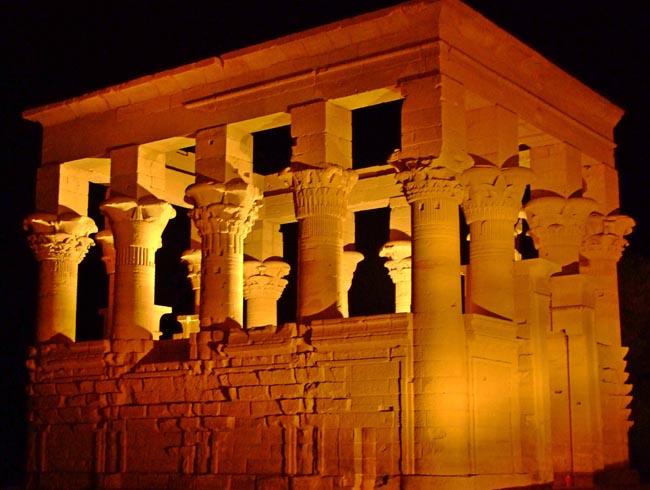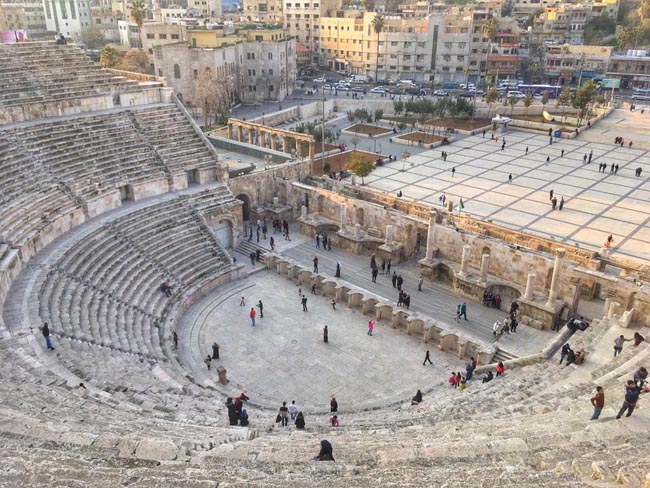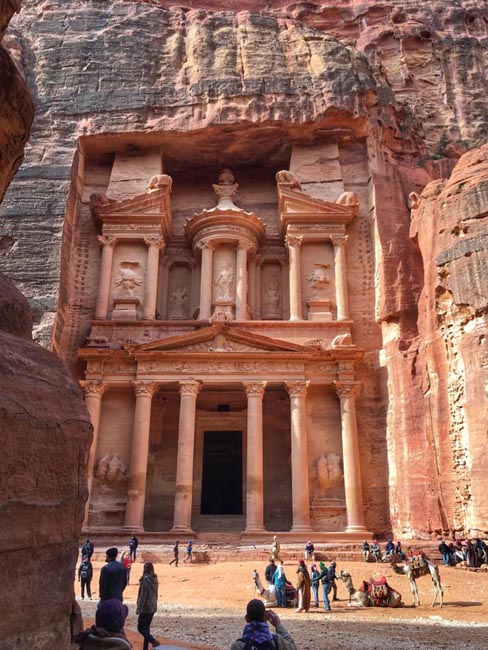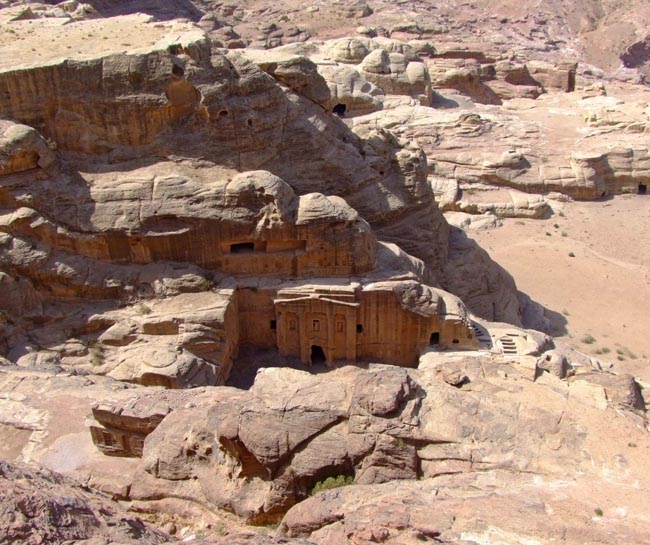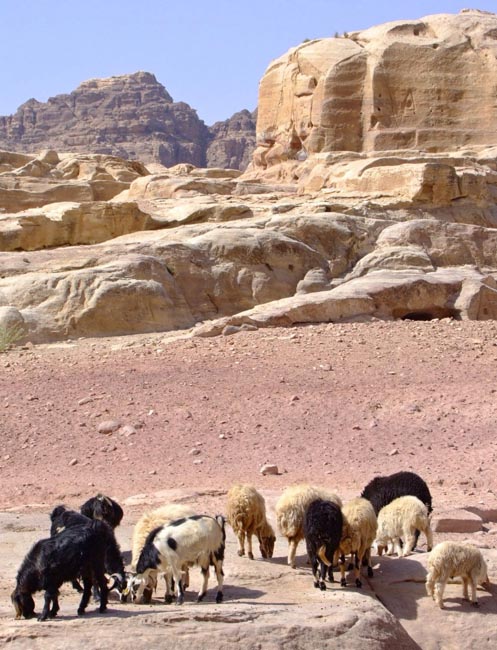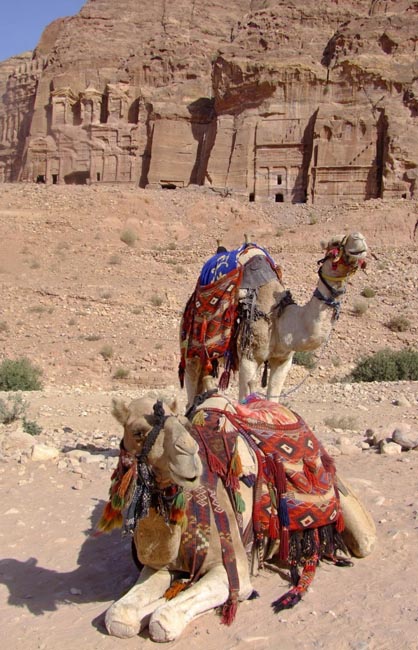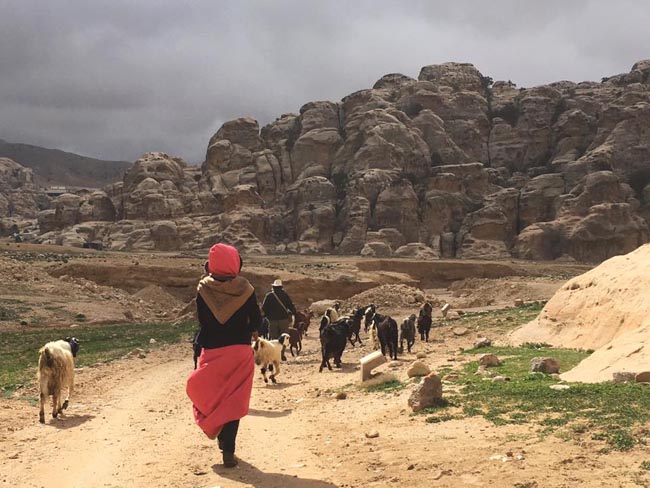Few places in the world hold such an array of archeological wonders such as Egypt and Jordan. Steeped in history, Egypt and Jordan tours venture into the ancient capitals and world wonders that have inspired for generations.
From the massive stone structures that make up the Pyramids of Giza to the lost city of Petra, these two countries are the chance to visit a fascinating region half as old as time.
Our journey as a company began in this captivating region, and since 1987 we have been delighted to take intrepid travellers on insightful tours across Egypt and Jordan. The allure of the mighty pharaohs and their monumental projects never cease to amaze.
While the Pyramids of Giza are often thought to be the pinnacle of important sites found within Egypt, our groups on Egypt and Jordan tours often remark that they are just the beginning.
Walk along the avenue of 1000 Sphinxes at Karnak Temple, which was built, added to, dismantled, restored, enlarged and decorated numerous times during its colourful history of over 1,500 years. Venture to the ancient trading town of Kom Ombo, which is actually two temples in one complete with a mummified crocodile which was once worshiped by the Egyptians.
Saddle up with a horse ride in the territory of the Valley of the Kings, to witness not only the destination of the funerary temple of Queen Hatshepsut, the first woman to rule as pharaoh, but also to get a sense of the modern Egyptian life in the quiet countryside villages.
With such an overwhelming list of immense temples and complexes, history tends to overshadow the reputation of natural beauty found in the area. Watching the sun rise and set over the sandy expanse of the Sahara as it extends from the green oasis on the banks of the Nile is as memorable as the hieroglyphics carved into the stone.
The colours of gold and pink that line the narrow gorge of the souq in Petra are nearly as photogenic as the elegant columns of the Treasury itself.
Sharing a cup of tea in a goat-haired tent in Wadi Rum with the Bedouin descendants who made up Lawrence of Arabia's army is an impactful moment of calm and an amazing experience within the land of red rocks that look as though they are melting in the setting sun.
The weightlessness one feels while soaking in the Dead Sea's turquoise waters is an unforgettable swim in the lowest place on earth.
In a land half as old as time, with features that make this region amongst some of the most rewarding journeys one can take, now is the right time to join our Egypt and Jordan tours, for it is a place that will etch itself into your memory and leave an impression for a lifetime.
Prices below are per person, twin-sharing costs in US Dollars (USD). Pricing does not include airfare to/from the tour and any applicable taxes. For single supplement rates and taxes (if any), please refer to below Prices & Dates table. For general information on flights to/from the tour, click here.
Your Travel and Accommodation Arranged For You
Tips Included for Driver, Restaurant Staff, Local Guides
Authentic Local Experiences With Lots Of Inclusions.
Select a date below to reserve your spot:
The above prices are subject to an additional $138 for taxes/fees levied on flights that occur as part of the tour. The internal airfares ARE included (any exceptions are listed in red below), but we list the taxes separately on your invoice as they are beyond our control and can change at any time.
Optional Single Supplement: $1770 USD (number of singles limited).
This tour may require a mandatory single supplement charge of $1330 if you join our share program and we are unable to pair you.
Download Itinerary
Day 1 Arrive in Cairo
Today we arrive in Cairo.*
Al-Qahira, literally "The Vanquisher" or "The Conqueror", is the capital of Egypt (about to be replaced by the city of "New Cairo"). The combined populations of the five cities that make up the metropolitan area on the Nile are over 21,000,000, making it the largest urban area on the continent. Nicknamed "The City of a Thousand Minarets" for its preponderance of Islamic architecture, Cairo has long been a centre of the region's political and cultural life.
* PLEASE NOTE - As tomorrow will be an early start and a full day, you may want to arrive a day early should your arrival time be late at night. Extra nights at the same hotel can be quoted/booked by your tour consultants once your flight schedule is known.
Overnight in Cairo.
Included Meal(s): Dinner
Day 2 Cairo: Great Pyramids & the Sphinx - Grand Egyptian Museum
This morning we kick off our comprehensive sightseeing program with some of the most iconic of Egyptian monuments: The Great Pyramids and the Sphinx.
Impressive in their grandeur, the pyramids are estimated to have been constructed over a period of 20 years using more than 100,000 labourers each year. The Great Pyramid of Cheops, constructed from over two million stone blocks, is 135m (443 feet) high! You may enter one of the pyramids through a long, narrow passageway and explore the deep inner chambers (OPTIONAL - extra fee applicable).
Later we visit the Sphinx. This feline-human was named by the Greeks because it resembled the mythical winged monster with a woman's head and lion's body. Legend has it that this "Sphinx" proposed a riddle to the Thebans and killed all who could not guess the correct answer! The Sphinx was carved from one solid piece of limestone.
We then continue to the Great Egyptian Museum (GEM), where we can break for lunch at your choice of one of several on-site restaurants/cafes.
After our break, our visit of the museum begins with a guided tour. The Grand Egyptian Museum is not only Egypt’s new crown jewel, but also be one of the largest, most modern, and most renowned museums in the entire world. The facility is host to more than 100,000 artefacts from many thousands of years of ancient Egyptian civilization and the comparatively more modern ancient Greek and Roman periods of Egyptian history.
During our visit we’ll also receive an explanation of one of the main themes that repeats throughout GEM -- “Kingship and Eternity” -- and witness how this is reflected in the monuments accessible to us on today’s visit, namely: The Hanging Obelisk, the Colossal Statue of King Ramesses II, the ten Statues of King Senusret I (distance view), the Grand Staircase (distance view), double statues of Ptolemaic King and Queen, the Victory Column of King Merenptah, the statue of the god Hapy, and the Statue of King Ramesses II.
Our visit will culminate with the ground-breaking "Tutankhamun - The Immersive Exhibition," which takes us on a mythical journey to the mesmerizing world of Ancient Egypt. Through state-of-the-art digital projections, you will have the unparalleled opportunity to step into the astonishing life of the legendary Golden King via an awe-inspiring audiovisual adventure that spans an astonishing 3,400 years of history.
After our visit we return to our hotel for dinner and overnight.
Overnight in Cairo (Giza).
Included Meal(s): Breakfast and Dinner
Not finding what you're looking for?
Our specialists can take away the stress and create a private custom tour tailored to your exact interests and budget.
Day 3 Cairo: Dahshur, Memphis & Saqqara
We have an early start for a full-day day of sightseeing. Our drive this morning takes us through the suburbs of Giza, past some small, colourful villages and plantations in the fertile Nile Valley.
We first travel to the stunning site of Dahshur, known chiefly for several pyramids, mainly Senefru's Bent Pyramid and the Red Pyramid, which are among the oldest, largest, and best-preserved in Egypt, built from 2613 to 2589 BC. These pyramids were an extremely important learning experience for the Egyptians as they provided knowledge and know-how to transition from step-sided pyramids to smooth-sided pyramids. Ultimately their breadth of experience would allow them to build the Great Pyramid of Giza.
We continue to Memphis and Saqqara, chronologically the two most important sites in all of Egypt. Memphis was the capital of Egypt during the Old Kingdom (ca 2700-2180 BC). Here we will see several statues in a garden-like setting, including the colossal statue of Rameses the Great.
From Memphis we travel a short distance to Saqqara, the ancient burial site for the people of Memphis. On the site, considered by many archaeologists to be one of the world's most important excavations, is the Step Pyramid, constructed by Imhotep in the 27th century BC. The pyramid began as a simple mastaba, or long, flat tomb building. Over the course of time, Imhotep added to this mastaba five times -- the pyramid eventually measured 62m (203 feet) in height!
While at Saqqara we also see the Serapeum, the tomb of the sacred Apis bulls that were associated with the god Ptah, whose cult center was in Memphis. An avenue of sphinxes leads to the Serapeum, which is composed of two long corridors that once housed the mummified remains of the bulls.
After a full day we return to our hotel.
Overnight in Cairo (Giza).
Included Meal(s): Breakfast and Dinner
Day 4 Cairo - Fly to Aswan: The High Dam, Unfinished Obelisk & Philae Temple
Another early start for our flight to Aswan in Upper Egypt.* Aswan is Egypt's sunniest southern city and an ancient frontier town. Small enough to walk around and graced with the most beautiful setting on the Nile, the pace of life in Aswan is slow and relaxing.
On arrival we'll take a trip to the High Dam of Aswan. Constructed between 1960 and 1971, the High Dam collects and stores water over a number of years so that the annual Nile flood can be controlled. From here we will have a panoramic view of Aswan to the north and Lake Nasser to the south.
We also visit Philae Temple. The temple is dramatically situated on an island, so we enjoy a short boat journey to get to the site. The site is relatively small, but the charm of the setting and the excellent state of preservation makes this a must-see.
On our way back to town, we'll visit the 'Unfinished Obelisk'. The obelisk's creators began to carve it directly out of bedrock, but cracks appeared in the granite and the project was abandoned. The bottom side of the obelisk is still attached to the bedrock. The unfinished obelisk offers unusual insights into ancient Egyptian stone-working techniques, with marks from workers' tools still clearly visible as well as ochre-coloured lines marking where they were working.
* NOTE: The actual order of our sightseeing in Upper Egypt may vary depending on variables such as flight schedules and weather. Your Tour Leader will keep you apprised of any adjustments as the tour progresses.
Overnight in Aswan.
Included Meal(s): Breakfast and Dinner
Day 5 Aswan: St. Simeon Monastery & Kitchener's Island
This morning we will take a private boat across the River Nile to the west bank. From here we travel by camel across the sandy desert to the Christian Monastery of St Simeon. Before we begin this easy trek, our Tour Leader and camel trainer will teach you the technique of riding a camel. This is a journey that can be undertaken by anyone at any age (one rider per camel). Our trek is about 45 minutes to the monastery, and then 15 minutes back to the riverbank. Those who prefer not to ride can travel by open truck to the monastery and meet up with the group there.
Dating from the 6th century, and in use until the 13th century, the Monastery of St Simeon is one of the best-preserved Christian sites in Egypt. Inside we will see the chapel, living quarters, kitchen and dining areas, wine press, bake area and storerooms. On our tour we will also see the remains of some Coptic frescoes -- depictions of Christ and saints as well as many geometric patterns.
We then return to the banks of the Nile and re-board our boat and ride among the islands dotting the Nile. Up the hill, above the river, is the Mausoleum of the Aga Khan, spiritual leader of the Ismailis, a Shi'ite sect based principally in India but with followers around the world. The tomb is an elegant pink granite structure of late 1950 origin.
The main island in the middle of the Nile is called Elephantine Island because many of the rocks look like elephants bathing in the Nile. On the west side of the river is the beautiful Kitchener's Island, where we will have time to stroll through the rich botanical gardens.
Later this afternoon we have a leisurely sail on a felucca, a traditional sailing vessel used for centuries for carrying goods and passengers along the Nile.
Overnight in Aswan.
Included Meal(s): Breakfast and Dinner
Day 6 Aswan: Abu Simbel
A pre-dawn departure by road (+/- 3 hours, each way)* takes us south from Aswan across the Western Desert to Nubia, or the "Land of the Gold". Our destination this morning is the impressive Abu Simbel -- the imposing rock temples of Rameses II and his queen, Nefertari.
We have a guided tour of this site, including the interior of the colossal temples. The Temple of Rameses II, with its immense statues of the Pharaoh seated on his throne, is one of the classic images of the power of the Pharaohs. Inside the temple you will see well-preserved wall decorations and several murals. There is a wonderful relief of Rameses presenting captives to various gods, including himself! We also gain insight into the reconstruction process by visiting the interior of the artificial mountain. Return by road to Aswan in time for a late lunch.
* When visiting Abu Simbel we choose to travel by road instead of flying as the air schedules tend to be rather restrictive and do not always allow enough time at the site (much time is taken up by check-in, security, boarding, transferring etc). Driving frees us from this inconvenience and adds flexibility, plus allows us to see the High Dam en route. Departing very early ensures that we are at the site at the optimal time for photography; later in the morning, shadows fall across the temple making conditions less than ideal.
Overnight in Aswan.
Included Meal(s): Breakfast and Dinner
Day 7 Aswan - Luxor via Kom Ombo & Edfu
This morning we say farewell to Aswan and travel by road to the Temple of Kom Ombo. In ancient times, Kom Ombo was strategically important as a trading town on the caravan route from Nubia to Cairo. Kom Ombo, actually two temples in one, is dedicated dually to Haroeris (Horus) and Sobek, respectively the god of the sky and the crocodile-headed god. Here we are able to see the remains of a mummified crocodile. Crocodiles no longer exist in the Egyptian part of the River Nile, but in Pharaonic times they lived here in great numbers and were worshipped as gods!
From Kom Ombo we travel to the site of Edfu. As the largest and most completely preserved Pharaonic temple, albeit Greek-built, Edfu is dedicated to the god Horus. Construction of this temple began under Ptolemy III Euergetes I in 237 BC. We will allow time to explore this massive and impressive site, enclosed by walls and flanked by two large pylon gateways. Here we will also be able to see a Nilometer -- an ancient technique of measuring the Nile's water fluctuations and setting the level of taxes
Overnight in Luxor.
Included Meal(s): Breakfast and Dinner
Day 8 Karnak Temple & Luxor Temple
This morning we start our day with a guided tour of Karnak Temple.
Karnak was built, added to, dismantled, restored, enlarged and decorated during its colourful history of over 1,500 years. At certain points in Egyptian history, this temple was the most important in all of Egypt. When we arrive at the temple you will be awed by the grandeur of the tremendous pylon gateway and the Avenue of 1,000 Sphinxes that originally ran all the way to the Nile and Luxor Temple! We will have a guided tour of the complex, massive by any standard.
After our visit, we enjoy a break before our evening visit to Luxor Temple. The temple was dedicated to the Theban Triad of Amun, Mut, and Chons and was built during the New Kingdom, the focus of the annual Opet Festival, in which a cult statue of Amun was paraded down the Nile from nearby Karnak Temple to stay there for a while, with his consort Mut, in a celebration of fertility. Luxor temple is considered one of the largest ancient Egyptian temple complexes situated on the eastern bank of the river Nile. At the entrance is a huge tower built by King Ramses II.
Overnight in Luxor.
Included Meal(s): Breakfast and Dinner
Day 9 Luxor: Valley of the Kings
Early this morning we cross the River Nile by boat to the West Bank where the wealth of antiquities is outstanding. On the other side we will meet our donkey-cart transport for our excursion into the Valley of the Kings through the New Gourna Village and into the countryside. Avoiding the busier road, we will witness quiet village life along the way for about 40-45 minutes before re-uniting with our road transport for the final leg into the Valley of the Kings.
Once in the isolated valley, dominated by large pyramid-shaped mountains, we will have a guided tour of three of the many tombs that are here.* The valley was the burial ground for kings throughout the New Kingdom. Note that some of the tombs have steep stairways and all are quite dark inside (you might find a pocket flashlight useful).
We then proceed to the funerary temple of Queen Hatshepsut -- the first woman to rule as pharaoh! We have a tour of this impressive complex, discovered in the mid-19th century and still under restoration.
After our tour we return by bus through the countryside back to the river and the East Bank. During free time this afternoon, we suggest a visit to the excellent Luxor Museum or Mumification Museum.
Tonight you may choose to visit the Sound and Light show at Karnak Temple (optional).
* We do not include the tomb of King Tut, as it is very small and not very interesting, relatively speaking, but we allow time for you to see it if you wish (separate ticket).
Overnight in Luxor.
Included Meal(s): Breakfast and Dinner
Day 10 Luxor: Valley of the Queens
This morning we make an excursion the Valley of the Queens.* After crossing the Nile we will board our bus for the short journey to visit this wonderful necropolis on the western shore of the Nile.
The Valley of the Queens was used as a burial site for the royal women of the 18th, 19th and 20th Dynasties. Ancient Egyptians called this place "Set Neferu" meaning Seat Of Beauty, and today only a few of the eighty tombs are open to the public (we will visit three). The Valley of the Queens holds far more than graves of queens. Please note that an OPTIONAL visit of the tomb of Queen Nefertari is available for an extra charge (your Tour Leader will advise of the current fee).
As well as our visit to the Valley of the Queens we will also have a guided tour of the workers' village and the Madinat Habu temple. Madinat Habu, also known as the temple of Rameses III was known in ancient times as Djanet, and according to ancient belief, was the place were Amon first appeared. Both Hatshepsut and Tuthmosis III built a temple dedicated to Amon here, and later Rameses III constructed his larger memorial temple on the site.
* Due to periodic and unannounced closures of the tombs at the Valley of the Queens, your Tour Leader may substitute the Tombs of the Nobles, which are equally interesting.
Overnight in Luxor.
Included Meal(s): Breakfast and Dinner
Day 11 Luxor: Dendera Temple & Time at Leisure
This morning we enjoy an excursion to the fascinating temple of Dendera located north of Luxor on the banks of the Nile.
Dendera Temple is one of the best-preserved temple complexes in Egypt. Located in the city of Qena (60 km north of Luxor) Dendera was constructed for the worship of Goddess Hathor, goddess of love, beauty, and motherhood in the ancient Egyptian religion. The temple was founded by pharaoh Pepi I (2250 BC) and continued during the New kingdom (1550-1080 BC). What was left dates back to the Greco-Roman time in Egypt. The recent cleaning of the ceiling of the Dendera Temple has revealed has exposed some of the most vibrant and colourful paintings dating from antiquity. The temple has two decorated crypts, two halls with ceilings supported by columns and two funeral chapels, from where the famous "zodiac" from the Louvre comes.
We return to Luxor for some well-deserved free time for independent exploration, shopping, napping etc after some full days of touring. The Luxor Museum is also worthwhile, as it displays a very good contextual story of Luxor and the nearby valley of the Kings and Queens. The wooden sarcophaguses are the highlight -- so vivid that it's hard to believe they are thousands of years old.
Overnight in Luxor.
Included Meal(s): Breakfast and Dinner
Day 12 Luxor - Cairo: Museum of Egyptian Antiquities
Today we fly back to Cairo.
On arrival we proceed to the famous Museum of Egyptian Antiquities,* where enjoy a guided tour of some of Egypt's most beloved treasures. Among the 100,000 pieces housed on the museum's two floors is the famous exhibit of Tutankhamun whose tomb was discovered by Howard Carter in 1922. The tomb and treasures of this young Pharaoh, modest by Pharaonic Egyptian standards, is perhaps the best-preserved of the discovered tombs. We also see archaeological relics from the Old Kingdom, Middle Kingdom, New Kingdom and Greco-Roman periods. There is also a separated area devoted to the best-known of the Tut antiquities (the Mummies Room), which you can enter for an optional extra fee (ask your Tour Leader for the current rate).
* With the (maybe partial) opening of the GEM and the unclear situation re the fate of the original museum, and the timing/choosing of which artifacts will be moved and which will remain, we'll plan to visit both facilities for now and adjust this program as things become clearer. Regardless of location, however, we definitely plan to see the Tut relics wherever they may be at the time of our visit.
Overnight in Cairo (central).
Included Meal(s): Breakfast and Dinner
Day 13 Cairo: Coptic & Islamic Cairo - Khan el Khalili
Today visit the new National Museum of Egyptian Civilization (NMEC), a nice addition to the Cairo museum landscape and an excellent way to recap all that we have done and seen during our tour.
We then drive through the neat, tree-lined streets of the Garden City area to Coptic Cairo, the centre of Christianity in Cairo.* We will walk the cobblestone streets and stop at a few of the churches, including that of Saint Sergius, presumed to be the spot where the Holy Family lived during their flight into Egypt. The present building dates from the 11th century. As we stroll along we will come to the recently restored Synagogue of Ben Ezra, the oldest Jewish synagogue in Egypt. Despite the 45 Jewish families that remain in Cairo, the synagogue is no longer operational.
We then proceed to Islamic Cairo, where we will tour the Citadel, begun by Saladin in the 12th century. Today the Citadel's buildings are mainly from the Ottoman period, and are truly grand. From the Citadel, actually a complex of three mosques and four museums, we enjoy an amazing view of Cairo spread beneath the hilltop. Here we will see the fabulous Mosque of Mohammed Ali, also known as the "Alabaster Mosque."
Finally we make a stop at Khan el Khalili, one of the most interesting bazaars, not only in Egypt, but also in all the Middle East. The atmosphere of this traditional market, together with the labyrinthine layout of the streets, gives visitors a glimpse into what medieval markets were once like.
* The Coptic Cairo section of our program exists here in a tentative basis given ever-changing security considerations in this district. Your Tour Leader will advise of the current status once you have arrived on tour and a substitution may be put into place.
Overnight in Cairo (central).
Included Meal(s): Breakfast and Dinner
Day 14 Cairo, Egypt - Amman, Jordan
This morning we will fly from Cairo to Amman, the capital of the Hashemite Kingdom of Jordan.
Amman, the modern and ancient capital of Jordan, is one of the oldest continuously inhabited cities in the World. The city's modern buildings blend with the remnants of ancient civilizations. The profusion of gleaming white houses, kebab stalls with roasting meat, and tiny cafes where rich Arabian coffee is sipped in the afternoon sunshine, conjure a mood straight from a thousand and one nights.
Overnight in Amman.
Included Meal(s): Breakfast and Dinner
Day 15 Amman: Jerash & Amman City Tour
Today we have a look at modern central Amman, visiting the Archaeological Museum, and the not-so-modern Roman Amphitheatre and the ruins of the Temple of Hercules.
We then leave Amman by bus for a tour of the extensive Roman site of Jerash. In the 1st and 2nd centuries AD, Jerash was a wealthy city and is today considered one of the most important and best preserved of all Roman sites. We visit the famous elliptical forum, the beautiful amphitheatre with its superb natural acoustics, and the site of the huge Temple of Artemis.
We will stop for our evening meal en route back to our hotel. This allows us to use our bus transport for this purpose and make for an early-ish arrival back to to the hotel after a full day.
Overnight in Amman.
Included Meal(s): Breakfast and Dinner
Day 16 Amman - Madaba - Mt Nebo - Shobak - Petra
This morning we travel to Madaba, a small town famous for its magnificent mosaic floors. A unique mosaic covers the floor of St. George's church and consists of a huge map of the Holy Land as it appeared in the 6th century AD.
Driving to the edge of the Jordan Valley we reach Mount Nebo from where Moses and the Children of Israel first saw the Promised Land. On a clear day you can look down to see the Dead Sea and the River Jordan. On the other side of the valley is the city of Jerusalem. Here we see a huge mosaic of hunting scenes covers the floor of a ruined Byzantine church.
We leave Mt Nebo and travel south; along this route, castles and towns were positioned a one day's travel distance apart. Later we visit Shobak Castle, built by the Crusaders in 1115 and sacked by Muslim forces under Saladin in 1189. We finish our full day at Petra.
Overnight in Petra.
Included Meal(s): Breakfast and Dinner
Day 17 Petra: Site Tour
Petra was the capital of the Nabataean Kingdom from the fourth century BC to the 2nd century AD. From the 12th century until its rediscovery in 1812, Petra was lost to the world -- a closely guarded secret of the local tribes. Today the 'rose red city half as old as time' is probably the most impressive archaeological site in the Middle East, rivaling the temples and pyramids of Egypt in grandeur.
This morning, on our way into the hidden valley of Petra, we will see the Obelisk Tomb and the irrigation system that carried water from a dam throughout the desert city. Access to the monuments of Petra is through a narrow gorge in the towering rocks called the 'Siq'. As we emerge from the 'Siq' you stand in awe in front of the 'Treasury' (El Kazneh), a graceful structure carved from the living rock. After pausing to admire the elegant columns and carvings we carry on into the valley where elaborate tombs are carved into the multi-coloured walls. Everywhere the sandstone swirls and twists in shades of red, orange, yellow, pink and white. Next we will see the Roman amphitheatre, carved directly out of the mountain, with space for over 3,000 spectators.
Further on in the main valley of Petra, are the Royal Tombs including the Palace Tomb and the Silk Tomb. We visit the temple of the Nabataeans' main god, Dushara, and we also see the 'Temple of the Winged Lion'. Our formal guided tour of the site terminates with a visit to the Petra Nabataean Museum.
At this point, you may explore further on your own, or return to our hotel to relax and/or shop. You may also take a strenuous walk up a narrow pass to see the magnificent 'Monastery' building, El Deir. The views of Petra and the surrounding area are expansive. The walk is steep and involves approximately 750 steps carved into the rock and will take APPROXIMATELY one hour up (30 minutes down).
NOTE: Access to Petra is by means of footpath only. The main sites occur near ground that is level and well-worn, though the overall site is huge. Our pace is leisurely with frequent breaks; however, to fully experience Petra you must be prepared for a considerable amount of walking and little shade. Please note that we include lunch today on the site of Petra instead of dinner this evening, which allows us to maximize our time here and still enjoy a relaxing sit-down meal without having to rely on carry-in packed lunches. Your Tour leader can assist with your evening meal plans back in the village, which we do not include today.
Overnight at Petra.
Included Meal(s): Breakfast and Lunch
Day 18 Petra: El Beidha & Leisure Time
This morning we travel by bus to the nearby Nabatean site of 'el Beidha' (known as 'Little Petra'). We will also see a settlement dating from the Neolithic period, some 8,500 years ago. This is one of the oldest sights in the Middle East; it shows evidence of habitation by a "Pre-Pottery" population who were herders experimenting with agriculture. We return to our hotel by bus.
This afternoon, you can either relax or re-enter the breathtaking main site of Petra to further explore on your own. There are a number of scenic walks/hikes that one can enjoy within the site. Ask your Tour Leader for details.
Overnight at Petra.
Included Meal(s): Breakfast and Dinner
Day 19 Petra - Wadi Rum
This morning we depart Petra by road bound for Wadi Rum, where Lawrence of Arabia conducted many of his campaigns during the First World War.
After a break for lunch, we’ll hop into smaller trucks and head out into the desert, where the sand is red and the huge rock formations resemble gigantic multi-layered cakes melting in the sun. We may be invited into a goat-hair tent to share a glass of tea with some Bedouin tribesmen -- the nomadic herdsmen of the desert who made up Lawrence's army. Running along the floor of the valley is the Hejaz Railway that Lawrence blew up repeatedly. Our excursion is a 3-hour route known as "Siq Al Barra and Om Eshreen."
Tonight we will be accommodated in a luxury tented camp where we enjoy a unique blend of traditional Bedouin culture and modern comfort.
Overnight in Wadi Rum.
Included Meal(s): Breakfast, Lunch and Dinner
Day 20 Wadi Rum - Dead Sea
Today we travel north along the Dead Sea Highway to the Dead Sea.
King David, King Herod, Jesus, and John the Baptist were closely linked with the Dead Sea and its surroundings. During the Egyptian conquest it is said that Queen Cleopatra obtained exclusive rights to build cosmetic and pharmaceutical factories in the area. Later the Nabataeans discovered the value of bitumen extracted from the Dead Sea used by the Egyptians.
We hope to arrive at our Dead Sea hotel in time for lunch (on your own). The hotel is located on the shores of the sea where you will have the chance to swim and experience your amazing buoyancy in the ultra-salty waters.
Overnight at the Dead Sea.
Included Meal(s): Breakfast and Dinner
Day 21 Dead Sea - Departure
Today we transfer back to Amman's Queen Alia International Airport to connect with homeward flights. Departure from Amman.
LAND ONLY customers make their own way directly to the airport by taxi directly from the Dead Sea (your Tour Leader will assist).
NOTE that many international flights from Amman depart late at night. Most passengers enjoy the extra "downtime" (ie all day today) at the Dead Sea; however, some prefer to depart earlier (ie last night). You might consider this situation and your preferences before finalizing your air.
RHLAH S'IDAH
Included Meal(s): Breakfast
Inclusions
Breakfast and dinner are included daily.
All transport, accommodation, sightseeing and entrance fees for sites noted as 'visited' in the detailed itinerary.
Gratuities for drivers, restaurant staff, porters, local guides.
Airport transfers for land & air customers arriving/departing on tour dates and for any early arriving/late departing travellers who book both their air and extra nights through us.
Exclusions
International airfare to/from the tour.
Tour Leader gratuities, most lunches, drinks, personal items (phone, laundry, etc), international (if applicable) and domestic air taxes, visa fees, and any excursions referenced as 'optional'.
Airport transfers for Land Only customers.
Optional trip cancellation insurance.
Our post-reservation trip notes offer further guidance on shopping, not included meals, visas, locally-paid departure taxes.
Seasonality and Weather
This tour is offered for much of the year, except the hotter summer months May-September. Outside of this time frame, we are able to achieve our busy program, which involves a lot of time outdoors, with greater comfort and safety. That said, once can still expect heat in some locales, especially in Upper Egypt, and especially during "shoulder" times, ie March/April & early October. At these times, your Tour Leader will do his/her best to structure our activities to take advantage of the more comfortable times of day to head out, which could mean some early starts and possibly a block of leisure time midday.
The coolest and most comfortable window is November-February, when Upper Egypt is comfortable and Cairo is cool-chilly. Jordan, however, can be downright chilly November-February, with crisp mornings that warm up as the day progresses.
Transport and Travel Conditions
EGYPT: Over two weeks we travel by bus, felucca sailboat, horse carriage, plane, donkey cart, and camel. Distances covered are not great and roads are good. The tour is not strenuous though it is busy; you must be steady on your feet and be able to endure some heat and some extensive archaeological sites. We have some full days, which can also involve some early starts as dictated by internal flights as well as some excursions, ie Abu Simbel, for which early departures are necessitated by distance and traffic. We also like to get to Abu Simbel in time for sunrise and before large crowds arrive.
JORDAN: Ground transport provided by private air-conditioned motor coach, 12-36 seats depending on ultimate group size. The tour is not strenuous though it is busy; you must be steady on your feet and be able to endure some heat and long travel days.
Our rating "Level 2" on this tour refers to its ambitious nature, full days, and plenty of time spent on your feet. Some days involve some early starts as dictated by internal flights as well as some excursions, ie Alexandria & Abu Simbel, for which early departures are necessitated by distance and traffic. We also like to get to Abu Simbel in time for sunrise and before large crowds arrive. Many sites visited are LARGE; surfaces are uneven and sloped, and stairs will factor into our visits. Heat can also be a factor in some locations which can, over time, cause fatigue. This is not an 'easy' tour; if you are unsteady or slow on your feet, rely heavily on a cane or any other mobility aid, or tire easily, we regret that this tour would not be suitable.
Though baggage handling is available throughout, you must still be able to fully manage yourself and your things, especially at airports.
IF YOU'RE WONDERING why we don't offer a Nile cruise between Aswan and Luxor, we find that by travelling between these two points overland we are able to include more sites in addition to Kom Ombo and Edfu, where we enjoy private sightseeing instead of having our group combined with other groups on the cruise program. Our independence also allows us to avoid peak periods and crowds at the times that cruise ships generally dock. We know that the notion of a Nile cruise has a special romantic appeal, but we (including our Tour Leaders) have always preferred this alternative. The ships spend most of their time tied up at the docks in Luxor and Aswan and the time actually sailing is rather limited and may occur at night due to the limitations of the transit lock system, which often gets backed up. As cruise programs tend to feature quite a lot of "down time," this option was rarely well-received by past travellers back in the day when we included it. We hope this clarifies!
Am I suitable for this tour? Please refer to our self-assessment form.
Activity Level: 2
These are particularly busy tours that feature a lot of moving around, sometimes by train and short journeys on local transport. Walking tours of towns and cities are leisurely but you should be prepared to be on your feet for several hours. Some of our cultural trips that occur at high altitude and/or require greater independence with baggage handling (at hotels, airports, train stations) also fall into this category.
To learn more about the Activity levels, please visit our tour styles page.
Accommodation
Hotels are clean, well-located, air-conditioned, 3-4 star (maybe the odd 5-star). Some properties have outdoor swimming pools. Single rooms are limited and possibly smaller than twins.
Please click on the "Map & Hotels" tab for more information.
Staff and Support
Tour Leader throughout, local drivers, local guides at various locations.
Group Size
Maximum 18 plus Tour Leader
Tour Extensions
This tour is part of a series that can be upgraded to make for a longer trip. For more options, please refer to tour code/s:
Tour Overview Countries Visited: 3 Acivity Level: 2 Tour Style: Cultural
The initial portion of this wondrous 27-day Egypt, Kenya & Tanzania Tour is an adventure through three breathtaking countries, any one of which would alone warrant spending at least a couple of weeks of a tour investigating the many famous attractions, begins on the banks of the Nile, in one of the most intense metropolises on the planet: Cairo.
We visit the major tourist hot-spots, like the awe-inspiring Great Pyramid, guarded by the regal sphinx - now a common symbol of Egypt's glory and mystery - Karnak Temple - which numbers among the most enriching archaeological sites in the world - and the UNESCO Heritage Site of the Valley of the Kings, wherein lie the tombs of nearly all the pharaohs from the 18th to the 20th dynasties.
Crossing into Kenya, we admire the glorious natural environment that endows the country with international acclaim in no fewer than four national parks and reserves: along with stunning landscapes of semi-desert savannah plains fringed by towering snow-tipped peaks and tranquil lakes, we see elephant, giraffe, cheetah, leopard, lion, antelope and wildebeest, to name but a few of the exotic wildlife on offer in one of Africa's prime safari regions.
In Tanzania, we visit the spectacular Ngorongoro Crater and take a trip to a land of superlatives in the ultimate safari destination: Serengeti National Park.
Few places can rival the Serengeti for safari experiences and then we bring our tour to an end investigating the fascinating past of the region with trips to archaeological sites of interest.
Tour Overview Countries Visited: 3 Acivity Level: 2 Tour Style: Cultural
Setting down in the bustling metropolis of Cairo, Egypt, we start this extraordinary 32-day Egypt, Kenya & Tanzania tour in magnificent style.
We see the Pharaonic monuments of the Great Pyramid and the Sphinx, which have since come to stand as symbols of Egypt's mystery and glory, walk cobblestone streets amid beautiful churches and buildings dating from the 11th century, embark upon horse-drawn carriage tours and enjoy donkey and camel rides.
Highlights of our 13-day odyssey through Egypt are our trip to the 1,500-year-old Karnak Temple, remarkable journeys through the valleys of the Kings and Queens and the longest river on the planet; the Nile.
As we fly into Kenya, it's not long before we discover why this special destination enjoys worldwide acclaim for its natural environment.
Gazing out over semi-desert savannah with the glistening glacier peak of the continent's second highest mountain - Mount Kenya - as a backdrop, we scan the endless plains in search of elephants, giraffes, cheetahs, leopards and lions, all the while marvelling at a pristine wilderness yet untouched by Man.
En route to the foothills of the towering Mount Kenya, we have the chance to see crocodiles, zebra, and ostriches, and we also have the opportunity to spend some time with local inhabitants dressed in traditional garb in tribal villages.
We see volcanic phenomena at the Great Rift Valley, watch out for the 'Big Five' in Masai Mara National Reserve, taste a variety of exotic local delicacies in the Carnivore Restaurant (with vegetarian options available) and make our way to the border of Tanzania amid glorious sceneries of rolling grasslands and African plains.
Continuing our tour of some of the best safari destinations in Africa and, indeed, on the planet, we visit Amboseli National Park at the foot of Mount Kilimanjaro, Ngorongoro Conservation Area, which boasts teeming wildlife as well as an incredible UNESCO-protected crater, and the epitome of all safari destinations at Serengeti National Park, wherein is to be found perhaps the largest concentration of wildlife in the world.
Interspersing admiration of its natural world with exploration of the country's man-made environment, we take in archaeological sites, colonial towns and the many historic sites of the 'spice islands' of Zanzibar.
Regions visited: Middle East
Countries visited: Egypt and Jordan
*The red tour trail on the map does not represent the actual travel path.
The following is a list of sample hotels at some locations included on this tour. The hotels shown here are meant to provide a general sense of the standard of hotel we usually aim for; they are not necessarily confirmed for your chosen departure.





Our spacious and comfortably furnished hotel rooms offer comfort at a high level. Indulge in culinary delights in our restaurants & bars.





Help yourself to the good life at Mövenpick Resort Aswan. From sunny pool days with the family to indulgent spa time, energizing workouts to immersive cultural experiences, we invite you to enjoy it during your stay in Aswan.





Our luxurious 5-star hotel specializes in organizing outstanding business events in the city of history and ancient Egyptian temples. We feature one-of-a-kind Royal Rooms with breathtaking views of the Nile, spacious suites, versatile meeting spaces, and state-of-the-art technology.














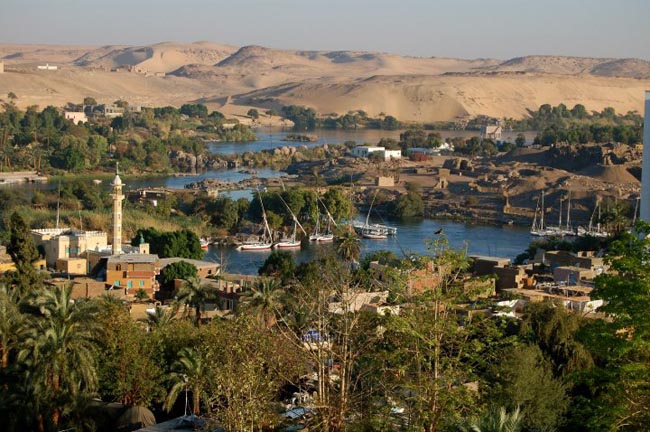


_modified.jpg)
